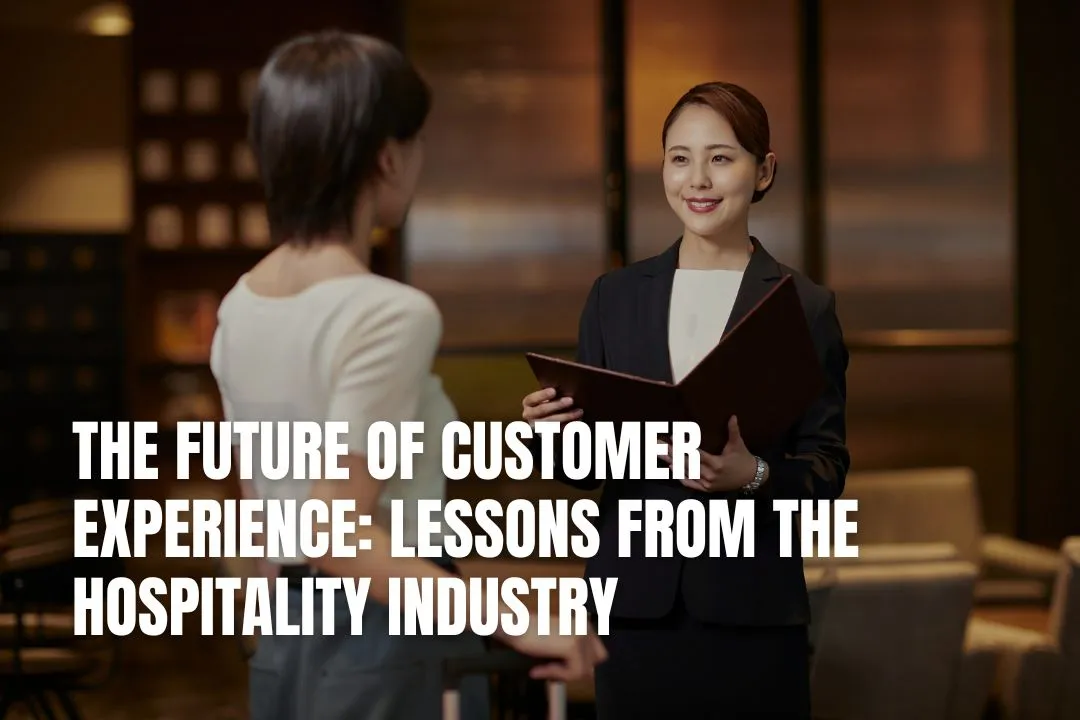
Editorial Disclaimer
This content is published for general information and editorial purposes only. It does not constitute financial, investment, or legal advice, nor should it be relied upon as such. Any mention of companies, platforms, or services does not imply endorsement or recommendation. We are not affiliated with, nor do we accept responsibility for, any third-party entities referenced. Financial markets and company circumstances can change rapidly. Readers should perform their own independent research and seek professional advice before making any financial or investment decisions.
Hospitality has always been a master's course in human connection. Great hotels and restaurants don’t just transact, they anticipate, remember, and delight.
As AI, automation, and data reshape customer expectations, the smartest brands in every sector are borrowing hospitality’s playbook.
The future of customer experience looks less like a call centre and more like a concierge desk: proactive, personal, and seamless from first hello to final follow-up. Here are seven hospitality-tested lessons any business can apply now.

In hospitality, the best experiences start with recognition: your name at check-in, your pillow preference remembered, your favourite table held back. That same dynamic now defines cross-industry CX.
CRMs, preference centres, and first-party data let brands greet customers with context, not guesswork. Think tailored bundles based on usage, timing outreach to a customer’s real cycle, or surfacing content that reflects past behaviour.
The operational lift is worth it because relevance is today’s loyalty currency. Personal wins over generic, every time.
Hospitality shows that automation and empathy are complements. Mobile check-in and keyless entry speed the journey, while staff focus on the moments that matter. The same balance applies to digital businesses: let machines remove friction, then elevate the human moments.
A restaurant using a virtual concierge can answer routine questions 24/7, capture dietary preferences, and recommend dishes from past visits, while hosts spend time welcoming guests and solving edge cases.
Design your stack so tech clears the runway and people deliver the takeoff.
A great hotel stay feels effortless because it’s choreographed behind the scenes. Housekeeping, dining, transport, and the front desk share one continuous picture of the guest (preferences, timing, and intent) so every interaction feels like part of a single conversation.
That same orchestration is what modern customer experience demands. Too many businesses still operate in silos: marketing doesn’t talk to sales, onboarding doesn’t sync with support, and the customer ends up reintroducing themselves at every step.
Unifying systems, automating key handoffs, and sharing real-time data across teams creates the seamlessness customers now expect.
Think of a brand journey that starts with an ad click, flows through a personalised checkout, triggers an instant thank-you message, and ends with a proactive “how did it go?” follow-up. When departments act in harmony, the entire experience feels intentional.
Across hospitality (from boutique hotels to high-end restaurants and wellness resorts), storytelling has always been at the heart of great experiences. Every detail, from menu design to lighting choices, works together to communicate a narrative about care, place, and identity.
Strong brand development starts with a story that customers can see, hear, and feel. A tech company might tell a story of empowerment through intuitive design and supportive onboarding. A retail brand could craft a narrative around craftsmanship and sustainability, reflected in packaging and customer service.
What matters is coherence – every touchpoint should reinforce the same emotional message.
Storytelling has become a key driver of modern marketing and customer trust. When customers sense that your story aligns with their values, they remember not only what you sell but how you made them feel. That emotional connection is what keeps them coming back.
The best concierges don’t wait for a request; they anticipate it: umbrellas before the rain, a late checkout unprompted. Proactive service scales with alerts, health scores, and predictive nudges.
Warn customers before a bill spikes, reship before they chase, surface “next best action” tips before frustration hits. Measure the downstream lift in retention and NPS, then fund more of it. Preemption feels like magic to customers, and it’s cheaper than recovery.
Modern hospitality ties experience to values – local partnerships, waste reduction, carbon transparency – because guests care how good feels are made. Customers expect the same across categories.
Make your sustainability story tangible within the journey: greener delivery options at checkout, repair before replace, transparent sourcing in product pages, and impact dashboards in account hubs.
This isn’t just PR; it’s preference formation. For practical ways to align digital with impact, explore how companies use marketing and the web to drive sustainability. Purpose builds trust, and trust compounds.
True hospitality is built on empowerment, not hierarchy. Whether it’s a restaurant server who can fix a meal issue without calling a manager, a spa therapist who personalises a treatment on the fly, or a flight attendant who adapts service midair, the freedom to act with judgment is what turns routine service into genuine care.
The same principle applies to any business that serves the public. Give frontline teams real visibility into customer history, context, and sentiment. Build systems that make decisions easy – flexible refund or credit policies, accessible data, and fast escalation paths when needed.
Equip them with AI tools that summarise interactions, flag urgency, and recommend next steps, but let humans retain agency.
Businesses everywhere can adopt that metric. When employees are trusted to do what feels right, the process becomes experience, and customers remember the care, not the protocol.
Personalisation has moved from being a nice extra to a basic expectation. Customers want you to recognise them and remember their preferences, making every interaction feel relevant and valued. It's how you build loyalty today.
You should use technology to handle routine tasks and remove friction, like mobile check-ins or automated responses. This frees up your team to focus on the more complex, empathetic interactions that truly matter, ensuring a balanced approach.
An orchestrated journey means all your departments, from marketing to support, work together seamlessly, sharing customer information in real-time. This ensures that every interaction feels like part of a single, continuous conversation, so customers never have to reintroduce themselves.
Storytelling allows you to build an emotional connection. By crafting a consistent narrative about your brand's care, identity, and values, you help customers see, hear, and feel what you stand for. This makes your brand memorable and fosters trust.
Proactive service anticipates customer needs before they even ask, like sending an umbrella before it rains. It feels like magic to customers and is often cheaper than trying to fix a problem after it has already caused frustration, leading to better retention and satisfaction.